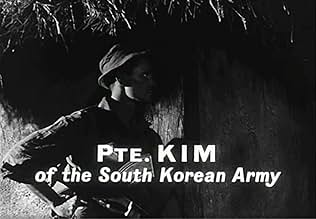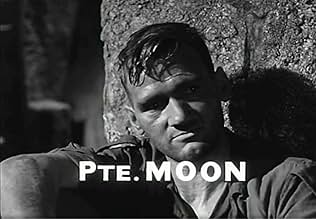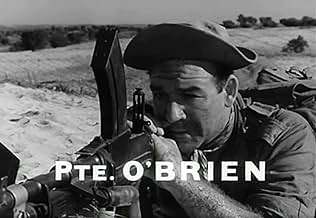During the Korean War retreat in 1951, a small British recon group is surrounded by Chinese troops and holds out in a lonely temple atop a hill.During the Korean War retreat in 1951, a small British recon group is surrounded by Chinese troops and holds out in a lonely temple atop a hill.During the Korean War retreat in 1951, a small British recon group is surrounded by Chinese troops and holds out in a lonely temple atop a hill.
Featured reviews
10clanciai
It's a small film but great in its making. The overwhelming credit of it is its absolutely perfect almost naturalistic realism, filmed in Korea and taking part of all the hardships of the soldiers at very close quarters. You get to know each of the soldiers individually, and MANY of them make unforgettable impressions. More of a curiosity is the presence of a very young Michael Caine among them as the youngest and the only blond one. He isn't noticed much and isn't seen much, but he is actually in it; while also Robert Shaw makes a very early and very palpable presence. The main characters though are Harry Andrews as stalwart and dominating in his imposing stature as ever, and Stanley Baker as the toughest and hardest of them. You don't like him, but in the end you must wonder if he wasn't right after all, while of course there is also the martyr, all lost and making his situation constantly more awkward in succeeding in doing everything wrong.
The settings are also quite impressing with the Buddhist monastery as a refuge, like a Korean Alamo for a last stand, but here there are actually some survivors; while the greatest quality of the film is the indivdual close-up attention given to everyone of these forgotten heros.
The settings are also quite impressing with the Buddhist monastery as a refuge, like a Korean Alamo for a last stand, but here there are actually some survivors; while the greatest quality of the film is the indivdual close-up attention given to everyone of these forgotten heros.
A Hill in Korea (AKA: Hell in Korea) is directed by Julian Amyes and adapted to screenplay by Anthony Squire, Ronald Spencer and Ian Dalrymple from the Max Catto novel. It stars George Baker, Harry Andrews, Stanley Baker, Michael Medwin, Ronald Lewis, Stephen Boyd and Victor Maddern. Music is by Malcolm Arnold and cinematography by Freddie Francis.
Out of British Lion Films, film is based on real events. Story follows a small group of British soldiers serving in the Korean War, who while out on routine patrol find themselves boxed in on all sides by the Chinese army. Against the odds the men, from different walks of life, must stand together to stand any chance of survival.
A Hill in Korea is more concerned with the conflict amongst the group of soldiers than it is with the enemy. 16 men, 10 of which are National Service conscripts, laugh, bicker, get scared and stand tall in readiness for what fate has in store for them. The upper crust and the working class thrust together makes for potent character dynamics, and of course it's a time when heroes and villains are born. This is a place where men apologise for getting injured, where they are told to fire their weapon instead of making love to it! And a place from which we know some will not return...
One of the very first films to deal with British troops in Korea (if not the first?), it inevitably has a familiarity about it if you be someone who often indulges in the War genre. However, the traditional flavours make this very appetising and the screenplay isn't shy of intelligence. Be it "friendly fire" or monologues about the futility of it all, film doesn't cop out. It's also very funny, with some absolute zingers delivered with caustic obviousness. Then there's the roster of great British actors that fill out the cast, with even the likes of Michael Caine (a real life servant in Korea) and Robert Shaw in secondary support slots. While Amyes keeps his camera up close for impact and Francis tones down the lighting to keep things sombre.
Well worth seeking out by fans of Brit war movies. 7/10
Out of British Lion Films, film is based on real events. Story follows a small group of British soldiers serving in the Korean War, who while out on routine patrol find themselves boxed in on all sides by the Chinese army. Against the odds the men, from different walks of life, must stand together to stand any chance of survival.
A Hill in Korea is more concerned with the conflict amongst the group of soldiers than it is with the enemy. 16 men, 10 of which are National Service conscripts, laugh, bicker, get scared and stand tall in readiness for what fate has in store for them. The upper crust and the working class thrust together makes for potent character dynamics, and of course it's a time when heroes and villains are born. This is a place where men apologise for getting injured, where they are told to fire their weapon instead of making love to it! And a place from which we know some will not return...
One of the very first films to deal with British troops in Korea (if not the first?), it inevitably has a familiarity about it if you be someone who often indulges in the War genre. However, the traditional flavours make this very appetising and the screenplay isn't shy of intelligence. Be it "friendly fire" or monologues about the futility of it all, film doesn't cop out. It's also very funny, with some absolute zingers delivered with caustic obviousness. Then there's the roster of great British actors that fill out the cast, with even the likes of Michael Caine (a real life servant in Korea) and Robert Shaw in secondary support slots. While Amyes keeps his camera up close for impact and Francis tones down the lighting to keep things sombre.
Well worth seeking out by fans of Brit war movies. 7/10
A Hill in Korea is a typical British war film, shot in crisp black and white and with Portugal doing a rather good job of standing in for the Korean countryside. The plot sees a British platoon cut off by Chinese forces and forced to take refuge on a hill which they must defend to the last man in the face of overwhelming attacks.
You know these sorts of films by now: half of the conflict comes from the besieging enemy, the other half from divisions within the group, as various characters crack or show their true heroic nature. And the low budget seems to work hand in hand with the plot of these films, helping to make them feel tense and claustrophobic. A Hill in Korea has a lot of casual racism in it, which was a bit of a surprise, but the all-star cast makes it worthwhile.
George Baker (TREAD SOFTLY STRANGER) is a dependable presence as the lieutenant leading the platoon, and Harry Andrews is once again the gruff sergeant - a role he seemed destined to play throughout his career. Ronald Lewis makes an impact as the guy going out of his mind, and others like Percy Herbert, Michael Medwin, and Stephen Boyd flesh out the rank and file troops. Best of all is the chance to see Robert Shaw and Michael Caine, both uncredited early on in their careers.
You know these sorts of films by now: half of the conflict comes from the besieging enemy, the other half from divisions within the group, as various characters crack or show their true heroic nature. And the low budget seems to work hand in hand with the plot of these films, helping to make them feel tense and claustrophobic. A Hill in Korea has a lot of casual racism in it, which was a bit of a surprise, but the all-star cast makes it worthwhile.
George Baker (TREAD SOFTLY STRANGER) is a dependable presence as the lieutenant leading the platoon, and Harry Andrews is once again the gruff sergeant - a role he seemed destined to play throughout his career. Ronald Lewis makes an impact as the guy going out of his mind, and others like Percy Herbert, Michael Medwin, and Stephen Boyd flesh out the rank and file troops. Best of all is the chance to see Robert Shaw and Michael Caine, both uncredited early on in their careers.
The Korean war seems to have posed a bit of a problem with film makers . It wasn`t untill Vietnam that screenwriters and directors tried to profound statements on the nature of conflict and wear their anti war sentiments on their sleeves. To all intents and purposes you could rewrite any Korean war film script without any problem . Indeed you could change the place names and you`d have the exact same story , and that`s the problem with A HILL IN KOREA , it could be set during the North African campaign of 1941 or the Burma campaign of 1942 or the Italian campaign of 1944 and it`d be the exact same film. The only telling difference is if it`d been set during the Second World War it would have starred John Mills.
It`s the casting of this film that makes it memorable, we have early roles for stalwarts of British cinema in the 60s and 70s: George Baker , Harry Andrews, Stanley Baker and Percy Herbert . And very early appearances by Robert Shaw , Stephen Boyd and Michael Caine ( Caine actually being an UN soldier in the Korean war ) who would all make it big in Hollywood. Sadly that`s the only memorable aspect on this film about " The forgotten war " . Forgotten that is except for the people who survived it
It`s the casting of this film that makes it memorable, we have early roles for stalwarts of British cinema in the 60s and 70s: George Baker , Harry Andrews, Stanley Baker and Percy Herbert . And very early appearances by Robert Shaw , Stephen Boyd and Michael Caine ( Caine actually being an UN soldier in the Korean war ) who would all make it big in Hollywood. Sadly that`s the only memorable aspect on this film about " The forgotten war " . Forgotten that is except for the people who survived it
It's 1951, and the Allies are on the retreat from the Yalu, with massive Chinese forces pursuing them south. A small unit of British troops is sent to reconnoitre a Korean village, and gets caught by two advancing Chinese battalions.
For all the formulaic treatment of soldiers maintaining a chirpy stoicism in adverse combat conditions, this film does have a certain gritty realism. George Baker as the rookie lieutenant burdened by command, and Harry Andrews as the tough old sergeant, are first-class. Don't blink, or you'll miss a very young Michael Caine as Private Lockyer, lamenting the death of Corporal Ryker (Stanley Baker).
The film works as a simple narrative of men under fire, but it certainly has some shortcomings. The narration which launches events may save the time and effort of explaining the plot, but would it not have been better for this information to emerge naturally out of the drama? When the hut explodes, there is a very obvious jump-cut. During the interval needed to get the actor out of the danger area, someone jolted the camera! Would the Chinese soldiers, even with their advantage in limitless canon-fodder, attack so recklessly across open, flat ground? At one point, close-ups are inserted to enhance the human reactions of the soldiers, but the trouble is, the lighting conditions do not match those of the master shot. Once the British soldiers retreat to the temple on the hill, the whole proceedings become totally studio-bound, with Shepperton fibreglass passing for buddhist architecture. The air strike relies too heavily on monotonously-repeated library footage of American planes. When the ending comes, it is a surprise in the wrong sense - the resolution is unconvincing, almost as if the film-makers didn't know how to extricate the soldiers. Surely a few bombs wouldn't clear the Chinese away for miles around?
Ronald Lewis plays Wyatt, the misfit who didn't want to be a soldier and who gets everything wrong. This character is needed in one sense, because there has to be some internal tension within the British camp, but Wyatt is not well done. His apostasy is overly-dramatic, and his immolation utterly unbelievable. This attempt to inject gaudy emotion into a basically stiff-upper-lip story just doesn't come off.
Verdict - Interesting 1956 British 'take' on recent war which ultimately succeeds, despite its flaws.
For all the formulaic treatment of soldiers maintaining a chirpy stoicism in adverse combat conditions, this film does have a certain gritty realism. George Baker as the rookie lieutenant burdened by command, and Harry Andrews as the tough old sergeant, are first-class. Don't blink, or you'll miss a very young Michael Caine as Private Lockyer, lamenting the death of Corporal Ryker (Stanley Baker).
The film works as a simple narrative of men under fire, but it certainly has some shortcomings. The narration which launches events may save the time and effort of explaining the plot, but would it not have been better for this information to emerge naturally out of the drama? When the hut explodes, there is a very obvious jump-cut. During the interval needed to get the actor out of the danger area, someone jolted the camera! Would the Chinese soldiers, even with their advantage in limitless canon-fodder, attack so recklessly across open, flat ground? At one point, close-ups are inserted to enhance the human reactions of the soldiers, but the trouble is, the lighting conditions do not match those of the master shot. Once the British soldiers retreat to the temple on the hill, the whole proceedings become totally studio-bound, with Shepperton fibreglass passing for buddhist architecture. The air strike relies too heavily on monotonously-repeated library footage of American planes. When the ending comes, it is a surprise in the wrong sense - the resolution is unconvincing, almost as if the film-makers didn't know how to extricate the soldiers. Surely a few bombs wouldn't clear the Chinese away for miles around?
Ronald Lewis plays Wyatt, the misfit who didn't want to be a soldier and who gets everything wrong. This character is needed in one sense, because there has to be some internal tension within the British camp, but Wyatt is not well done. His apostasy is overly-dramatic, and his immolation utterly unbelievable. This attempt to inject gaudy emotion into a basically stiff-upper-lip story just doesn't come off.
Verdict - Interesting 1956 British 'take' on recent war which ultimately succeeds, despite its flaws.
Storyline
Did you know
- TriviaOpening credits prologue: "This film is dedicated to National Servicemen and Drafted Men of the Free Nations past, present and to come."
- GoofsThe troop enter a (mostly deserted) Korean village, finding a couple of innocent peasants. One soldier breaks the door of a shack, which the 'peasants' had booby trapped. The entry of the soldier and subsequent explosion are a jump cut, with the edit visible between the two shots, as the light and shadows had moved between filming each shot.
- ConnectionsFeatured in The Many Faces of...: Michael Caine (2011)
- How long is Hell in Korea?Powered by Alexa
Details
- Release date
- Country of origin
- Language
- Also known as
- An vorderster Front
- Filming locations
- Shepperton Studios, Shepperton, Surrey, England, UK(studio: made at Shepperton Studios. England.)
- Production companies
- See more company credits at IMDbPro
- Runtime1 hour 20 minutes
- Color
- Aspect ratio
- 1.37 : 1
Contribute to this page
Suggest an edit or add missing content


































